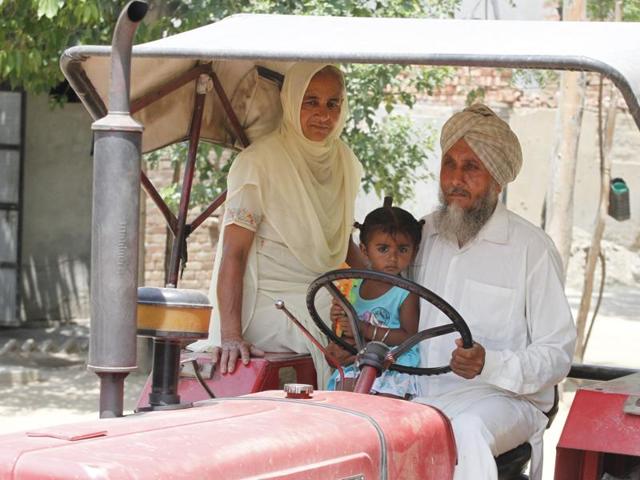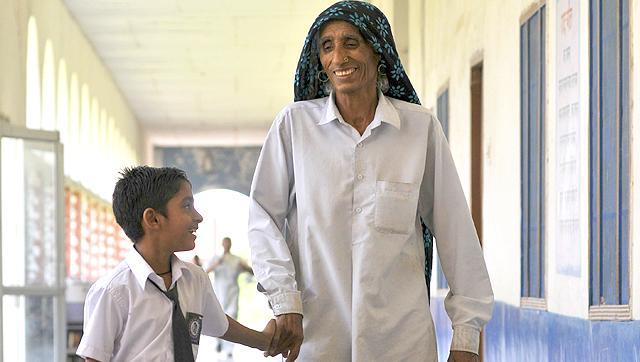Parents at 70: Reproductive choice or pushing the ethical limits?
Elderly couples, some of whom are well into their 60s and 70s, are having babies via IVF. Are doctors pushing the limits when it comes to IVF in women over 50?
On a phone call from Ahmedabad, obstetrician Dr Mehul Damani of Planet Women hospital patiently explains how the Kutch-based Punjiben Patel, 60, got pregnant last year. “The Patels had been trying for a baby for many years. We told them this would not be easy, and there were no guarantees,” says Damani.

Over the next seven months, Punjiben, who had been menopausal for 15 years at the time, was injected with hormones to restart her menstrual cycles, and prepare her uterus that had shrunk with age. Subsequently, an embryo was created with a donor egg and her husband’s sperm, and implanted in her womb.
Nine months later, Punjiben delivered a baby boy. Planet Women has since had three more cases of women in their 60s who have opted for IVF and are pregnant now.
This ‘feat’, however, is not specific to Ahmedabad’s Planet Women.Earlier this month, Amritsar’s Daljinder Kaur, 70, delivered a baby boy at Hisar’s National Fertility and Test Tube Baby Center. The Center’s website boasts of several “successful” cases of IVF births in post-menopausal women, some of whom are well into their 60s and 70s.
Read:IVF helps 70-year-olds become first time parents
The latest in this list of “successes”, the case of Daljinder Kaur, has triggered an ethical debate: should doctors support the “reproductive autonomy” of women such as Daljinder and Punjiben? With technology, they can, but given the inherent health risks and the issue of childcare, should they?
“It’s totally unethical,” says Dr Duru Shah, Mumbai-based gynaecologist and vice-president, Indian Society for Assisted Reproduction. “In pregnancy at that age, the heart, the kidneys come under pressure; the tissues are already aging. There’s enough data to prove that risks exist in women over 50 years of age,” Shah says.
Unfazed by the criticism, Dr Anurag Bishnoi, owner and embryologist at the National Fertility Centre insists that he ensures thorough medical check-ups for his patients, and claims that the centre has done about a “hundred such cases”, mostly from Haryana and Punjab.
Read:The search for heirs in Haryana
One of them is Rajo Devi, who became mother to a baby girl in 2009 at 71. When this author had met Rajo in 2010 in the district of Jind, she was breastfeeding her daughter, Naveen, and appeared confident of seeing the child through adulthood. However, Naveen’s birth has had consequences for Rajo: in 2010, she had to have her uterus removed after there was bleeding.
Six years later, Rajo has been diagnosed with cancer.
Bishnoi, however, argues that in such cases, risks exist only when more than one embryo is transferred into the womb -- a practice that is routine in many IVF clinics -- to ensure pregnancy, a procedure that he claims to have done away with.
Despite his ‘assurances’, however, many such as Shah feel that doctors need to draw a line when it comes to women over 50. This limit has been validated by the draft Assisted Reproductive Technology (Regulation) Bill, 2014, which prevents clinics from performing the procedure on women and men over 50. But Mumbai-based infertility specialist Dr Aniruddha Malpani disagrees: Pregnancies in older women do have an “increased risk of medical problems such as hypertension or diabetes,” but determining a “safe age limit” is “unfair” and “arbitrary,” he says. “The safe age limit depends on how well the heart, kidneys and lungs function. Some countries have tried putting an age limit, but usually bureaucracies can never do a good job of determining what the right age is,” he says. However, in cases such as that of Daljinder, Malpani advocates caution on part of doctors.

Globally, debates around post-menopausal births have provoked equally passionate responses. In 2009, the death of the world’s oldest mother, Maria Carmen del Bousada -- a 69-year old Spanish woman who had children via IVF in 2006 -- due to ovarian cancer, three years after she gave birth, led to heated debates on the subject.In the UK, there were several discussions when the cut-off age for IVF was raised to 42 from 39.
In the Indian context, however, Bishnoi insists that the “social pressures” of being childless, having a legal heir, or, as in many cases, trying for a baby to compensate for the untimely death of a child, are reason enough to not deny parents “choice”. “Surrogacy is not acceptable in these areas, so the only option for them is to go for pregnancy at that age,” he says. Of course, the parents should appoint a local guardian to take care of the child after they are gone, says Bishnoi.
In the wake of India’s booming IVF industry and a lack of a regulatory mechanism, women’s health activists have long argued that the tropes of “freedom” and “choice” in IVF treatments often mask the inherent risks. In the rural areas of Haryana and Punjab, technology — howsoever invasive, expensive and risky — offers an “easy” route to subvert nature and preserve family lineage, leaving long-term issues such as childcare, unresolved. “Entrusting children to relatives is a dangerous prospect. What about their safety after the parents are dead?” wonders advocate Anurag Chawla, who specialises in legal matters around assisted reproductive technologies.
Read:Outsourcing motherhood:India's Reproductive Dystopia
It’s not that the new parents don’t feel these dilemmas though. In a poignant comment to the British press, Susan Tollefsen, who became the country’s oldest mother at 57 (in 2006) has stated: “I get a great emotional feeling when I look at her [her daughter], and a sadness when I realize time is running out”.
When age is no bar: A mother at 70
Rajo Devi, 78, stands tall in the school corridor, proudly awaiting her seven-year-old daughter Naveen Lohan’s arrival from Class 2. The little girl, who looks more of a little boy in her uniform, runs to her, squealing in surprise. Normally, the bus takes her home but today her mother has come. An excited Naveen plays with her mother’s dupatta as she smiles indulgently, the wrinkles on her face folding further.

Back home, Naveen bangs impatiently at the door, calling out for her elderly father. Clad in a dhoti and white sleeveless kurta, Naveen’s illiterate father, Bala Ram, 78, looks on patiently as she sits on his thin, frail lap, tugging at his sagging cheeks and talks about her day at the school. Within a minute, the Nokia mobile phone on the bed catches her eye and she gets busy in her world.
“Manga ladka tha par ladki mili. Abhi toh ladke se bhi pyaari hai hamein yeh (We prayed for a son but got a daughter. Now she is dearer to us than a son),” Bala Ram says, lighting up a beedi. One of five brothers, he says he owns 5 acres. He took a loan of Rs 70,000, sold his buffaloes and the cart to fund Rajo’s IVF treatment and Caesarean section in 2009. He admits the surgery has taken a toll on Rajo’s health. She has undergone two more operations at the PGI, Chandigarh, since Naveen’s birth. She had to be operated upon for intestinal obstruction twice and was diagnosed eventually with cancer.
Ask them why they chose to become parents at such an old age, Bala Ram says, “Kyun? Sabke 8-10 bachche ho sakte hain, hamara ek bhi nahin? (Why? People can have 8-10 children and we can’t have even one?)” Rajo, however, sees hope in her younger sister who stays with them. Naveen also says she has two mothers. Aware of her “senior status”, she jokes, “My best friend is my niece who studies in Class 10.” Yojana Yadav
Read: When science plays God: Meet the grand old parents in the age of IVF
Catch your daily dose of Fashion, Health, Festivals, Travel, Relationship, Recipe and all the other Latest Lifestyle News on Hindustan Times Website and APPs.




